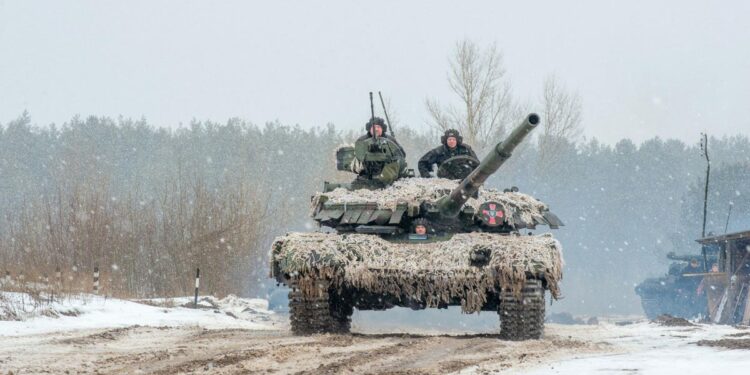Tensions between Russia and the West over a possible invasion of Ukraine have reached their zenith. If a shooting war between the two ex-Soviet states does erupt, it will likely happen within the next 72 hours, or not at all (this does not preclude the possibility of limited border incursions by Russian troops or perhaps the formal recognition of Ukraine’s breakaway provinces ). But whatever course this crisis takes, one thing is certain: Europe must seriously reevaluate its energy security position vis-à-vis Russia and act now.
One promising move has been made in this regard.
Earlier this month, the European Commission presented a plan to change the ‘taxonomy’ of green investments to include natural gas and nuclear energy. This means that 1) investments in nuclear plants can be called ‘sustainable’ for the next two decades so long as there are plans to safely dispose of nuclear waste and 2) that investments in gas-fired plants could get a ‘green’ label until at least 2030 if emissions are under a certain level.
This is positive step in Europe’s necessary “all of the above” strategy to secure its energy needs. Natural gas is bridge fuel that’s easily transportable and much less harmful to the environment than toxic, carbon-laden coal. Nuclear power is carbon-free and incredibly dependable – the ideal baseload power source.
However, ‘sustainability experts’ across Europe are slamming the new classification as so-called “greenwashing.” The EU platform on Sustainable Finance – a major critic of the draft taxonomy – acknowledges that although “transitioning our whole economy to meet climate neutrality by 2050 and 55% greenhouse gas emissions reductions by 2030 goals require consideration of many issues….[natural gas and nuclear] are both environmentally harmful technologies.” German politicians are among the most vocal opposers of the new taxonomy.
Curiously, Germany sternly criticized the plan to define nuclear investments as environmentally friendly while signaling it was at least open to labelling some natural gas projects as so. It’s no wonder why they are considering a softer tone on the latter, given the recent completion of Nord Stream 2 which will pump 55 billion cubic meters (bcm) of gas annually into Germany. German heavy industry runs on natural gas.
But the country’s reluctance to use nuclear energy is confounding. The policy has led them to shut down half of their six remaining nuclear plants. Germany’s oft cited concerns over a Fukushima type disaster happening on their soil is also unfounded – unlike Japan, the Central European country is not on any seismic fault lines, and therefor safe from earthquakes and tsunamis. While valid apprehensions over waste disposal exist, there are many solutions. One smart answer — bury it.
But as a result of Germany’s eschewing of nuclear power, the economy has become more polluting, more reliant on coal power, and more dependent on Russian gas.
This dependency has given Moscow unprecedented leverage over Berlin and the rest of Europe. For months, lawmakers have claimed that the Kremlin deliberately withheld natural gas shipments during the continent’s energy shortage to drive up prices. They were right. So intertwined is the relationship — with Russia providing close to 30% of Europe’s oil and gas needs — that the EU is paralyzed over the severity of retaliatory sanctions in the case of invasion. Implications for their own economies would be dire (though United States, Qatar, and Australia can provide enough imports to replace Russian gas in the event of a total cutoff).
On the other side of the spectrum is France, which has for decades chosen carbon-free nuclear power as the keystone (over 70%) of their power sector. On Thursday, President Emanuel Macron pledged to construct 14 new-generation reactors, alongside a series of smaller nuclear reactors — a laudable decision. France is also pioneering a cost-effective way to dispose of spent fuel rods while simultaneously repurposing fuel for other uses. This plan involves locating deep geological sites that have not moved in millions of years and burying the fuel rods in an underground facility where the nuclear waste will lose its radioactivity over a few hundred thousand years.
New technologies are also making nuclear safer and more efficient. Liquid metal or molten salt reactors means plants can operate at higher temperatures safely – more energy for less cost. Small modular reactors (SMR) are also crucial to making the transition from fossil fuels cheaper. SMRs are smaller than typical nuclear reactors providing less energy – but are significantly more affordable and easier to produce relative to traditional plants since they can be built in factories and shipped anywhere around the world. Their modular designed allows them to be ‘stacked’ so that energy needs for a project can be met precisely at a fraction of the cost and time it would take for a similar capacity nuclear power plant project.
German Chancellor Olaf Scholz and his coalition would be wise to rethink their relationship with Russian energy exporters – Russia is not a credible natural gas supplier, and renewables are only helpful if the wind blows and the sun shines. With invasion looming, Scholz must also reverse course on his energy supplication to President Vladimir Putin. Hard consequences for Nord Stream 2 must be laid out in case of Russian aggression. And finally, attacks leveled against Europe’s new energy taxonomy must end. Only an “all of the above” approach can break Europe free from the Kremlin’s grip.
With Assistance from Marco Rodriguez











